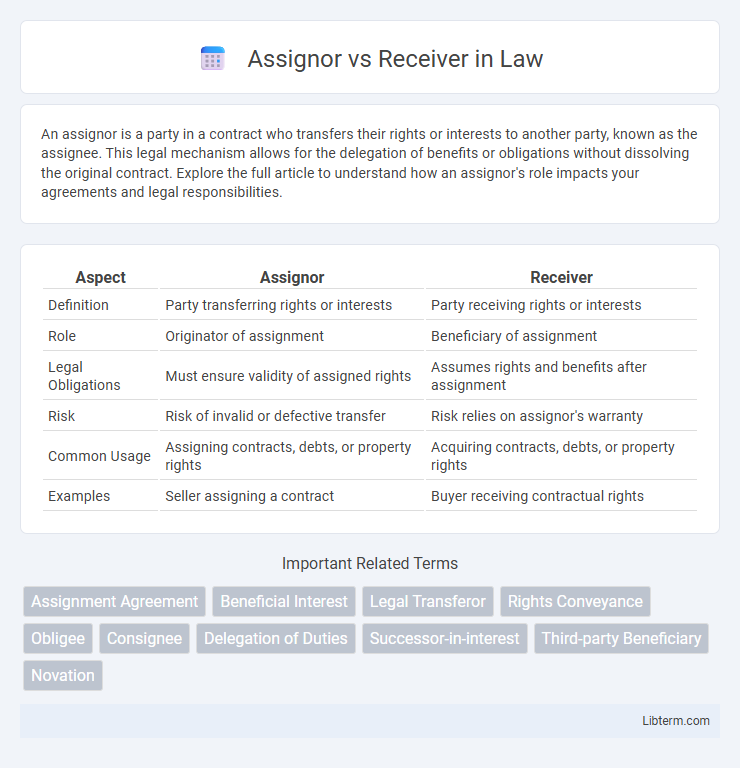An assignor is a party in a contract who transfers their rights or interests to another party, known as the assignee. This legal mechanism allows for the delegation of benefits or obligations without dissolving the original contract. Explore the full article to understand how an assignor's role impacts your agreements and legal responsibilities.
Table of Comparison
| Aspect | Assignor | Receiver |
|---|---|---|
| Definition | Party transferring rights or interests | Party receiving rights or interests |
| Role | Originator of assignment | Beneficiary of assignment |
| Legal Obligations | Must ensure validity of assigned rights | Assumes rights and benefits after assignment |
| Risk | Risk of invalid or defective transfer | Risk relies on assignor's warranty |
| Common Usage | Assigning contracts, debts, or property rights | Acquiring contracts, debts, or property rights |
| Examples | Seller assigning a contract | Buyer receiving contractual rights |
Introduction to Assignor vs Receiver
An assignor is the party in a contract or agreement who transfers rights or benefits to another party, known as the receiver or assignee. The assignor originally holds the contractual rights and legally passes these rights to the receiver, who then assumes the benefits and responsibilities outlined in the agreement. Understanding the distinct roles of assignor and receiver is essential for clarity in contract law and the effective transfer of obligations or entitlements.
Key Definitions: Assignor and Receiver
An assignor is the party who transfers rights or interests in a contract or property to another party. The receiver, often called the assignee, is the individual or entity that obtains these rights or interests from the assignor. Understanding the roles of the assignor and receiver is crucial in contract law for ensuring clear obligations and rights during the assignment process.
Legal Roles and Responsibilities
The assignor holds the legal responsibility to transfer contractual rights or interests to the receiver, ensuring that the assignment complies with existing laws and contractual terms. The receiver assumes the rights and obligations under the original contract from the assignor, including performance duties and potential liabilities. Understanding the distinct legal roles of assignor and receiver is crucial in contract law to ensure proper transfer and enforcement of rights.
Types of Assignments and Transfers
Assignments vary by type, including absolute assignments, which transfer all rights permanently, and partial assignments, where only specific rights or interests are transferred. Transfers can also be distinguished between voluntary assignments, initiated by the assignor's choice, and involuntary transfers, arising from legal actions such as bankruptcy or foreclosure. The receiver's role differs accordingly, as they may obtain complete ownership rights or limited, conditional interests depending on the assignment or transfer type.
Rights and Obligations of Assignors
Assignors hold the primary obligation to transfer all assignable rights and interests in a contract or property to the receiver without retaining any residual claims. They must ensure that the assigned rights are free of encumbrances and that the assignment does not violate any existing contractual restrictions. Assignors remain liable for any breaches or deficiencies that occurred before the assignment, preserving the receiver's ability to enforce the rights effectively.
Rights and Obligations of Receivers
Receivers hold the right to manage, control, and protect the assigned property or assets for the benefit of the assignor or creditors, ensuring fiduciary duties are met. Obligations of receivers include maintaining accurate records, acting in good faith, and complying with court orders or agreements governing the assignment. These responsibilities guarantee that receivers safeguard interests while facilitating the lawful transfer or liquidation of assigned rights.
Common Scenarios for Assignor vs Receiver
In contract assignments, the assignor often initiates the transfer of rights or obligations to the receiver, commonly seen in lease agreements where tenants assign leases to new renters. In financial transactions, assignors transfer receivables or payment rights to receivers, prevalent in factoring arrangements for businesses managing cash flow. Legal settlements also feature this dynamic when plaintiffs assign claim rights to receivers to facilitate dispute resolution or debt recovery.
Differences Between Assignor and Receiver
The assignor is the party who transfers rights or interests in a contract or property, while the receiver is the individual or entity who accepts and assumes those rights. Assignors initiate the assignment by legally conveying their entitlements, whereas receivers legally obtain and enforce these rights. The key difference lies in their roles: the assignor relinquishes control, whereas the receiver gains control over the assigned rights or obligations.
Legal Implications and Risks
The Assignor transfers contractual rights or obligations to the Receiver, shifting legal responsibilities and potential liabilities. Risks for the Assignor include remaining liable if the assignment is incomplete or unauthorized, while the Receiver assumes obligations and must ensure adherence to contract terms to avoid breach consequences. Courts often scrutinize the assignment's validity, making clear documentation and understanding of statutory requirements essential to mitigate disputes and enforceability issues.
Conclusion and Practical Considerations
The assignor transfers rights or interests in a contract or property, while the receiver assumes those rights and obligations. Clear communication, thorough documentation, and understanding legal implications are crucial to avoid disputes and ensure enforceability. Practical considerations include verifying the assignor's authority, assessing the receiver's capacity to fulfill obligations, and addressing potential third-party consent requirements.
Assignor Infographic

 libterm.com
libterm.com